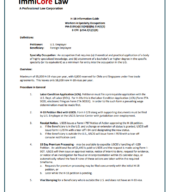Workers in Specialty Occupations
INA §101(a)(15)(H)(i)(b), 8 CFR §214.2(h)(1)(B)
The H-1B Visa allows qualified US companies to sponsor highly skilled foreign nationals to come work in the United States on a temporary basis in specialized occupations. These specialty occupations include, but are not limited to: IT, Computing, Finance, Accounting, Banking, Engineering, Teaching, Medical, Legal, and Telecommunications. In order to qualify for the H-1B Visa, foreign nationals must have a minimum of a Bachelor’s degree (or equivalent) and the offer of employment must be for a related specialized occupation which requires the minimum of a Bachelor’s degree.
The United States Government has a congressionally mandated annual limitation (“cap”) on the number of new H-1B Visas that can be granted per fiscal year, often leading to a lottery where more applications are filed than there are available H-1Bs. With great demand and limited supply, it is important that sponsoring employers consult an attorney who understands the extremely detailed process of obtaining work authorization in the U.S. Our firm can assist in the preparation of the H-1B petition and review all supporting documentation to ensure that employer sponsors do not fall victim to the common H-1B Visa pitfalls which lead to the rejection of many applications each year.
H-1B Requirements
- The employee (beneficiary) must have at least a bachelor’s degree, or the equivalent, from an accredited college or university;
- The employer must obtain certification from the Department of Labor on a Labor Condition Application (LCA);
- The offered position must be in a specialty occupation. A specialty occupation requires:
(a) theoretical and practical application of a body of highly specialized knowledge, and
(b) the attainment of a bachelor’s or higher degree in the specific specialty (or its equivalent) as a minimum for entry into the occupation in the U.S.
H-1B Cap
There is a congressionally mandated annual limitation on new H-1B approvals. Currently USCIS is authorized by congress to grant a maximum of 65,000 H-1B visas per year, with 6,800 reserved for Chile and Singapore under free trade agreements. This leaves only 58,200 new H-1B visas per year. An additional 20,000 H-1B visas are available for individuals who have received a U.S. Master’s degree or higher from a U.S. accredited college. These numerical limitations are known as the “H-1B Cap.”
USCIS runs an online registration to enter candidates in the annual H-1B lottery in the month of March every year for positions commencing the 1st of October that fiscal year. If the 65,000 cap is not met by the first round of selections submitted after the lottery, USCIS runs another lottery later in the year.
H-1B1: Singapore and Chile
Within the H-1B cap, there are an additional 6,800 annual H-1B1 visas per year reserved for nationals of Chile and Singapore. The qualification criteria and application process is the same as for H-1B visas, however, nationals of Chile and Singapore can often apply for H-1B1 classification well after then annual H-1B allotment has been fully utilized.
Cap-Exempt (H-1B Filings Not Subject to Annual Numerical Limitations)
There are certain categories of Beneficiaries and Employers who are exempt from the annual numerical limitations on on H-1B visas, these petitions are “Cap Exempt” and can be filed year-round, regardless of that year’s usage of the numerical allotment of new H-1Bs. Cap Exempt Petitions include:
- Filings for Beneficiaries who have previously had a Cap Subject H-1B filed on their behalf in the past 6 years (this includes H-1B Extension, Amendment and Change of Employer “Transfer” filings, as well as certain filings for Beneficiaries in other valid immigration statuses or outside of the U.S.)
- J-1 physicians who have obtained a waiver
- Sponsoring Employers who are:
a. Institutions of higher education or a related or affiliated non-profit entity
b. Non-profit or Government research organizations - Workers in H-1B in CNMI and Guam until Dec. 31, 2014
Change of Employer (Transfer) Filings
Employers can file H-1B petitions for individuals who are already in H-1B status. This is commonly known as an “H-1B Transfer.” A person changing their employer under these circumstances can legally work for the petitioning employer upon receipt of the H-1B petition through a “port” under AC21.
Labor Condition Application (LCA)
In order to obtain an H-1B Visa, the employer must submit a Labor Condition Application (LCA) to the Department of Labor (DOL) which outlines that:
- The employment of the foreign national does not harm American workers,
- The foreign worker will be paid the prevailing wage for the industry in which they will work,
- The employer will not employ the foreign national in the event of a strike or lock-out. Once the application is approved, the employer must file a petition with the United States Citizenship and Immigration Services (USCIS).
Dependents
Beneficiaries of H-1B visas may be joined by their qualifying dependents (spouses and children). Qualifying dependents would apply for dependent H-4 visas (if required). Upon entrance into the U.S. H-4 dependents are not permitted to work.
Time Limitations
An H-1B visa classification is granted initially for up to 3 years. Additional extensions up to 6 years may also be obtained. Yearly extensions beyond 6 years are available where the individual has met certain requirements under AC21.
Dual-Intent and Future Green Card Applications
An H-1B visa is a “dual intent” visa. This means that a person on an H-1B visa can have the temporary intent to work for an H-1B employer, but also have the intent to permanently reside in the U.S. Thus, because of this dual intent, a person on an H-1B visa can also simultaneously have their application for permanent residence (“green card”) pending – furthermore, the allowance for dual intent does not differentiate between family and employment based applications for permanent residence.

